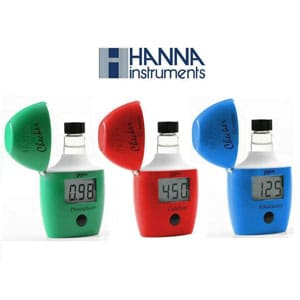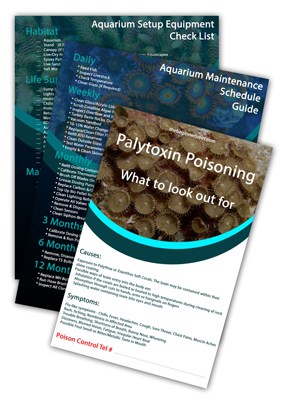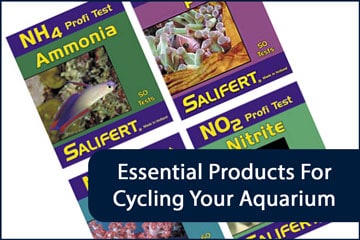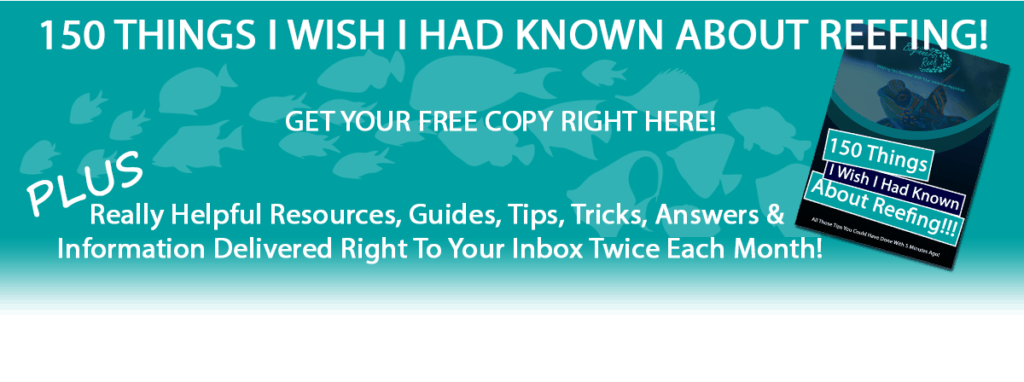If you are looking into test kits you must be well on your way to an amazing reef tank! Congratulations!
One of the first things you are GOING TO NEED when you set up your new aquarium is test kits. You will need these to monitor your water parameters during your tank cycle so you will know when it is ready for adding livestock. You will also need them to test weekly when you start adding corals.
Ammonia, nitrate, nitrite, pH, salinity & temperature test kits are needed to cycle a reef saltwater aquarium. Once corals begin to be added then calcium, magnesium, alkalinity, and phosphate test kits will be required to maintain perfect water parameters essential for a healthy saltwater aquarium.
I never had test kits when I was into freshwater as I never really needed to know what was going on with my tank. Just doing the regular weekly water changes kept everything in line. However, that all changed when I got into saltwater aquariums and the high cost of livestock came into play.
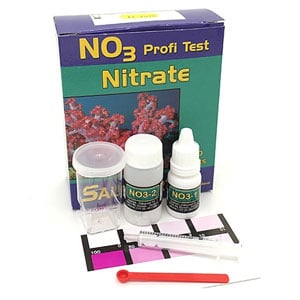
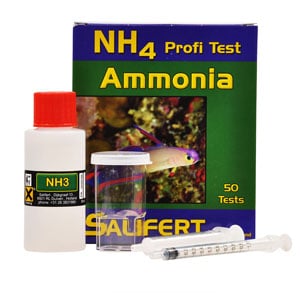
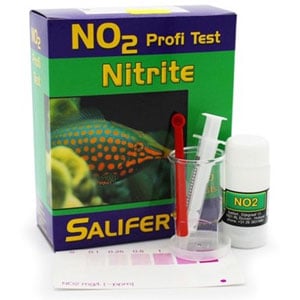
I personally love the Salifert range of test kits as they are PERFECT for knowing what is going on in your tank.
There is a test kit for every parameter you could ever need to monitor in your water, they are super simple to use and are explained very well in their instructions. These are the only kits I use!
Salifert test kits are recommended as the best test kit for saltwater aquariums by a vast majority of experienced reef keepers and myself. It’s the only brand I use!
You can find the Salifert Range of Test Kits Here at Amazon.com
I have tried other kits and found that they were either not accurate enough, too expensive or were a hassle to use.
Which Test Kits Do You Need When First Starting A Saltwater Aquarium?
When you first fill your reef tank with water you are about to enter into the ‘Cycling Stage’ and you will need to monitor every day or two to see how your bacteria are building and how the biological filter is growing.
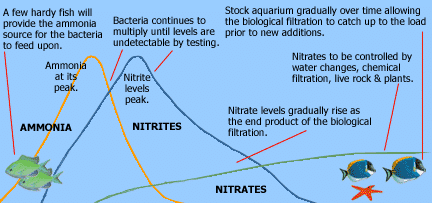
I recommended 5 things you will need to buy to monitor the progress of your tank when you first set it up and begin its cycle:
Digital Thermometer
To ensure your tank temperature remains constant at the set temperature. Most saltwater tanks are in the 78-80°F or 25-27° C range. The is the best time to get your temperature steady before adding livestock.
I prefer a simple digital one like this one Here at Amazon.com
Refractometer
This simple tool is in every experienced reefer’s toolbox. It is used to monitor the salinity of the water daily, weekly to ensure the specific gravity of the water never fluctuates. You will need this when adding your salt to your batches of
You can find an inexpensive Refractometer Here at Amazon.com
Ammonia Test Kit
This is the first peak you will look for when cycling a tank. Ammonia is the source of food the bacteria will need to feed on and then multiply. You should start to see the Ammonia start to peak around the 7-10 day mark.
Find the Ammonia Test Kit Here at Amazon.com
Nitrite Test Kit
This will be the next spike you are looking for. This is the bacteria turning the Ammonia into Nitrite. You can see on the chart, as Ammonia begins to decline the Nitrite is rising.
Find the Ammonia Test Kit Here at Amazon.com
Nitrate Test Kit
The Nitrates are beginning to build and break down the harmful Nitrites into less harmful Nitrates. As you are testing every day or two you are waiting for the Ammonia and Nitrites to drop to zero, and then in a few weeks, the Nitrates should drop to zero as well.
Find the Ammonia Test Kit Here at Amazon.com
For more information on the Nitrogen Cycle of an aquarium please read my article Here.
Which Test Kits Will You Need When You Begin To Add Corals To a Reef Tank?
Not all corals will need you to monitor any extra water parameters but once you start to get into corals that grow by creating a hard shell or skeleton, you will need to start monitoring a few extra water parameters.
Here are a few coral types you will need to start monitoring for element consumption:
- LPS – eg: Frogspawns, Hammers & Torches
- SPS – eg: Montipora, Acropora, Millipora & Chalice
- Clams – eg: Derasa, Maxima, Squamosa
Soft Corals like Ricordia, Mushrooms, Zoanthids, Toadstools do not really require monitoring. They consume very little of the elements and regular water changes will keep these happy.
The corals bulleted above, especially SPS, consume Calcium, Magnesium, and Carbonate (Alkalinity) to build their skeletons. They can only get these elements from the water and once your corals start growing and you buy more, they can consume at a rapid rate.
Up to a certain point, your water changes will keep up with the demand but you will get to a point where you need to add these elements by dosing to your tank daily to ensure the prime levels are maintained to allow your corals to continue to grow.
When adding corals to your aquarium you will need to monitor:
- Ph
- Alkalinity
- Calcium
- Magnesium
- Phosphate – If this is high it will prevent your corals from growing. Important to monitor with SPS Corals.
How Often Do You Need To Test Aquarium Water?
When the aquarium is brand new testing water parameters should be done every day or two during the nitrogen cycle. Once the cycle is complete most aquarium owners will test at the same time once a week. If livestock begin showing signs of illness or stress then daily testing may be needed again.
During your tank cycle, test every day or two until you see both Ammonia & Nitrite spike and then drop to zero and Nitrates rise then fall below 5ppm, preferably at zero. Nitrates in reef tanks are not good and you should always try to aim for zero or as close to it as you can.
When my reef was running without any hard corals I would just test for nitrates once a week before the water change.
Once I started adding LPS and SPS I would test once per week to monitor Nitrates, Calcium, Alkalinity, and Magnesium. If I found the alkalinity was being consumed rapidly I would test Alk and CAL every day for a week to monitor the drop each day. This would then show me an average of what each element is being consumed each day how much I needed to supplement
Do You Test Aquarium Water At The Same Time?
Everything to do with your Coral Reef Aquarium is aiming for stability. Your testing regime is an important part of this stability program. Your main aim of water testing is about getting accurate results. When I test my reef, it is on Tuesday evening around 8pm each week. This provides me with a consistent benchmark.
Just like plants, your fish, coral, and bacteria all work on a daily cycle of activity. By testing at the same time of the day each week, you are testing in the same activity period as the last time. Your parameters can fluctuate throughout the day, so by testing at the same time you get the most accurate result.
For more information on this please see my article:
What Is The Best Time To Feed Your Saltwater Fish?
How To Test Aquarium Water If You Are Color Blind?
Many people find matching colors on fluid-based aquarium test kit comparison cards very difficult, especially if their eyesight is not very good or they are color blind in the color range the test kit is using. Luckily there are some great test kits to help.
For aquarium owners who are colorblind, digital testing equipment can be used when testing water parameters. Hanna Checker, Pinpoint, and Neptune Systems Trident are some of the most popular digital testers that show the results in a numerical readout rather than a color comparison chart.
These are Awesome but are more expensive to purchase in the beginning. You can buy the refill kits to keep testing when your fluids run out thus preventing you have to buy the whole tester again. These are becoming very popular as there is no mistaking the reading given.
Click Here to see the Hanna Checkers at Amazon.com
Do Aquarium Water Test Kits Expire?
YES, Test Kits Do Expire!
Most aquarium test kits have a shelf life of several years. Each test kit box will have a label with a ‘Use Before’ date printed on it. When shopping for a new test kit try and pick the kit with the longest remaining life on the label. Out-of-date test kits could give inaccurate results.
Overdosing your reef can kill it! It has been done! Have a Google around the forums for people overdosing Alkalinity. It is more common than you would believe!
For most owners, they will use all of the test kit before it expires especially once they get into SPS and begin testing very regularly!
Aquarium Water Testing Tips:
Have a book or a whiteboard and write down all your test results each time you test. This will give you an easy way to track trends in any parameter. This has saved my butt more than once in identifying a problem early.
1. DO NOT Drink Beer or Wine While Testing! Seriously!
I like to have a beer AFTER I have done my testing and maintenance. I used to have a beer or 3 while doing my Tuesday night maintenance until one night I almost crashed my tank by getting my alkalinity results wrong and started to adjust my dosing pump to suit.
Luckily I caught the mistake the next day but it could have been fatal for my aquarium.
2. Test, Test & Test! All the tanks I have been to rescue have been mostly because of lack of testing. When I get a blank look off the owner as I ask what their Specific Gravity usually sits at or what’s the normal Alk level and I get the ‘Deer in the Headlights Look’ I know where to start.
3. Test at the same time, every week – Keep your results consistent.
4. Buy your test kit replacements before you run out. You never know when you may have an issue and need to test every day to prevent a tank crash. This saved my reef once!
5. Try not to be distracted when doing your testing – Distractions cause mistakes.
6. If a parameter looks off, test again. If it still looks off try a friends test kit in case you have a bad kit or a kit that has developed an issue.
7. If you mix batches of saltwater for big water changes, always test your batch before adding it to the tank, especially if you have just opened a new salt bucket.
There have been times when a salt batch was wrong and testing was the only way to avoid a tank crash when adding your new water.
8. Ensure your new water going in matches the water coming out. Especially for Temperature and Salinity.
9. If you are heavy in SPS, match the Alkalinity, Calcium
To Finish
Salifert, in my opinion, makes the best test kits for saltwater aquariums with Hanna coming in closely behind with their digital checkers. However, their digital checkers are only available for a set range of parameters at this time.
The Salifert range is vast and you will find they have a test kit for almost any parameter you wish to test. Their instructions are super simple to follow, The results are easy to read and best of all they don’t take long to do.
Testing is an important part of monitoring your water to ensure your inhabitants are living in the best possible habitat that you can provide. Regular testing will alert you to declining trends which you can address early and prevent a disaster.
To help you even further I have created these FREE handy guides for you. If you would like them, and more please Click Here
To find all the products you will need during your cycle CLICK the image below to go to my recommended products guide:
Further Reading
You may find the following articles useful after reading this:

